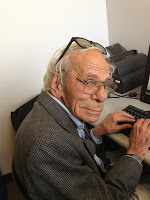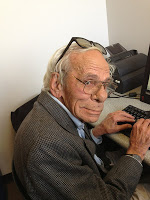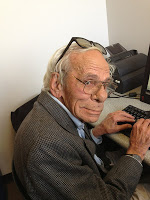Mayflower were ancestors of Prescott Townsend
ancestors. Another forebear was the only man to sign the Declaration of
Independence, the Articles of the Confederation, and the Constitution. On
almost any route that Townsend took to grade school on Boston’s Beacon Hill, he
would past a monument to an ancestor or to an event in which some kinsman had
participated
blue bloods of Boston still considered themselves Brahmins and felt contented. Henry James called them, “the sifted
few”. Besides his inherited wealth, his
father was also the head of a large coal company. When Townsend was fifteen his father
died. At sixteen he told his mother that
he liked other boys. She merely
answered, “Be careful.”.
out West to work in logging and mining camps of Idaho and Montana where he met
people unlike himself. The International
Workers of the World, derisively called the Wobblies were trying to organize a
union amongst the unskilled workers and hobos with whom Townsend worked. He developed a lifelong interest in street
boys and drifters, the outcasts of society.
interested in tennis than books, but he survived. So many attractions drew him into a very
active social life. After all, he was in
the SOCIAL REGISTER. Harvard was very
pro-British during the first years of World War I. To do his part, he joined the Naval
Reserve. After the United States had
entered the war, Townsend was called to the colors, where he performed various
duties including being commanding officer of the Naval Unit at Texas A &
M. After being demobilized, he returned
to Harvard to finish his senior year and later to enter law school.
his first year he quit. So many
interesting things lured him on to various adventures. In the tropics of
Mexico, he was the co-discoverer of an unknown salamander which was named for
him. In Paris, Andre Gide recommended
the deserts of North Africa. Townsend
organized a small caravan with willing. complaisant, or hungry young men. During his visit the Rift Rebellion, an
attempt by the Arabs to oust the French was taking place. One small battle interrupted the progress of
his party. He insisted that the fight
stop because he as an American had precedent over their squabbles. Strangely enough the combatants ceased their
gunfire while the American passed. How
things have changed for American tourist!
involved with the Bohemians; in fact, Bohemia became a part of him for the rest
of his life. In Boston he was the patron
of poets and a little theater. Actually
he owned the building where the theater had its quarters. His house became a home for various nomads of
the artistic and Gay worlds. Although he
bragged he had never paid for sex, it was difficult to turn down a man who is
supplying you with bed and board. During
his later years, all of his tenants chipped in to pay a handsome young man to
supply Townsend’s needs
more than a horny old man. He was a Gay
activist. Actually one could make that
ACTIVIST. The Boston chapter of the
Mattachine Society had him for one of his co-founders. Just as all the chapters had strife between
the radicals and the conservatives. The
organization asked him to make his efforts to repeal the sodomy laws of
Massachusetts a personal cause rather an organizational one. Townsend did not want understanding and
sympathy from the public but rights.
Confrontational was his usual means of operation. On April 17th,
1965, he was in Washington for the first Gay demonstration. Seven Gay men, three Lesbians, and a straight
woman friend marched in front of the White House. No doubt he was the oldest. In 1970, he drove down from Boston for the
first parade to commemorate the Stonewall protest. Even at seventy-six, he was amongst the first
two hundred to start the parade which grew to thousands.
welcomed by other Gays because he had evidently forgotten the meaning of
personal hygiene and looked like derelict.
No matter he was a participant in Gay functions.
remembered for uncompromising attitude toward Gay rights, his early organizing
of Gay, and his early participation in early Gay demonstrations.
2005
upon the durability of my partnership with Carl Shepherd; we have been together
for forty-two years and nine months as of today, August 18the, 2012.
I was born in Macon, Georgia in 1928, I was raised in Birmingham during the
Great Depression. No doubt I still carry
invisible scars caused by that era. No
matter we survived. I am talking about
my sister, brother, and I . There are
two things that set me apart from people.
From about the third grade I was a voracious reader of books on almost
any subject. Had I concentrated, I would
have been an authority by now; but I didn’t with no regrets.
the University of Alabama and the Air Force, I came to Denver. Here I met Carl, who picked me up in Mary’s
Bar. Through our early life we traveled
extensively in the mountain West. Carl
is from Helena, Montana, and is a Blackfoot Indian. Our being from nearly opposite ends of the
country made “going to see the folks” a broadening experience. We went so many times that we finally had
“must see” places on each route like the Quilt Museum in Paducah, Kentucky and
the polo games in Sheridan, Wyoming. Now
those happy travels are only memories.
amongst the first members of the memoir writing class. While it doesn’t offer criticism, it does
offer feed back. Also just trying to
improve your writing helps no end.
now in a nursing home, I don’t drive any more.
We totter on.






